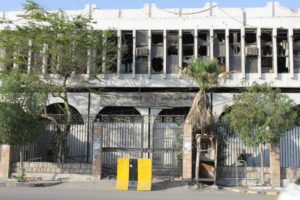Cash Crisis destroying Yemen

The Central Bank of Yemen strongly criticized the Arab coalition led by Saudi Arabia for blocking flights carrying cash to Yemen, thus aiming to "strangle" the national economy.
The currencies of most Arab countries are closely linked or closely tied to the US dollar, but Yemen was torn apart by a two-and-a-half-year civil war led by Saudi Arabia.
Since the beginning of the war, the central bank has prevented the country from collapsing financially despite the fact that the population suffers from malnutrition.
The Hadi government last year transferred the central bank of the capital Sanaa to the southern port city of Aden, where the government is currently based, in a move that economists feared could hasten the collapse of the country.
The central bank thus has impoverished reserves but plays a key role in alleviating famine and generalized diseases by paying certain public sector wages.
The governor of the bank said in a statement that this situation prevented the government to pay the salaries of one million civil servants.
The coalition led by Saudi Arabia, which is allied with the Hadi government in the face of the Shi'ite rebels who control Sana'a, the capital, and part of the country, has banned 13 flights supposedly bringing liquidity from Russia to the headquarters of the country.
The bank regrets this situation which reduces the activities of this country of the Arabian Peninsula. The governor's remarks seem to show the existence of deep divisions between the government and the coalition supposed to support it.
Mohammed bin Salman, the new crown prince of Saudi Arabia, told two former US officials that he "wanted" the war in Yemen, according to emails issued Monday by Middle East Eye.
In addition, the World Health Organization said on Monday that cholera killed 2,000 people and infected about 500,000 people in Yemen. Half of the country's health facilities are out of service, many of which have been bombed by the coalition. Government workers, including doctors, have not received their salaries for nearly a year, hampering efforts to fight the cholera epidemic.
For ICSFT this situation is intolerable. Depriving a country of its financial resources is tantamount to weakening the rule of law and therefore human rights. Because of Saudi Arabia, Yemen can no longer provide for its population in public service such as hospitals. This accelerates the proliferation of disease and famine.
ICSFT condemns in its strongest terms the Saudi invasion in Yemen, especially air strikes on civilians and the struggling of its economy by vicious methods; ICSFT urges the Saudi government to stop the genocide in Yemen and remove the sanctions on flights, and to stop denying this monstrosity. ICSFT calls for all the UN and the international community to put an end to this war.
